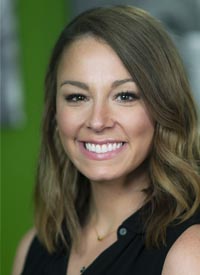 The Autism Society of North Carolina is pleased to announce that Whitney Sukonick, MA, LPA, BCBA, has been named as the organization’s new Clinical Director, following the retirement of Dr. Aleck Myers. Sukonick has worked at the Autism Society of North Carolina since 2014 and previously served as the director of LifeLong Interventions, our Applied Behavior Analysis (ABA) program.
The Autism Society of North Carolina is pleased to announce that Whitney Sukonick, MA, LPA, BCBA, has been named as the organization’s new Clinical Director, following the retirement of Dr. Aleck Myers. Sukonick has worked at the Autism Society of North Carolina since 2014 and previously served as the director of LifeLong Interventions, our Applied Behavior Analysis (ABA) program.
“I am thrilled that Whitney Sukonick will lead our Clinical team,” said Tracey Sheriff, Chief Executive Officer of the Autism Society of North Carolina. “Whitney was instrumental in building LifeLong Interventions, and we all benefit from her expertise, enthusiasm, and commitment to the individuals and families we serve.”
Sukonick discovered her career path as an undergraduate at the University of North Carolina Wilmington. A psychology major, she knew she wanted to work directly with people but wasn’t sure what form that would take until she worked in the research lab of Dr. Carol Pilgrim, a well-known behavior analyst. “Working in Dr. Pilgrim’s lab crystallized my vision for what I wanted to do. I discovered behavior analysis and realized it was a tangible way to help people,” said Sukonick. “ABA was less well-known then, but it’s an amazing program at UNCW and I was lucky to be there – in the right place, at the right time, with a really great mentor.”
After receiving her master’s degree and certification in behavior analysis at UNCW, Sukonick completed a clinical internship in pediatric feeding disorders at the Kennedy Krieger Institute in Baltimore. After the internship, she stayed on in a behavior analyst role where she provided a variety of support to the patients with feeding disorders outside of the mealtime context, including building communication skills and tolerating tube changes.
“My time at Kennedy Krieger set the bar really high for me in terms of what I wanted out of a team and out of an organization,” said Sukonick. “I worked with a great interdisciplinary team that showed me the power of having a lot of different perspectives at the table. I saw how powerful integrated care can be as a wraparound for the people you’re serving and their families. Because Kennedy Krieger is one of three programs in the country that specializes in pediatric feeding disorders, families traveled from all over the world to receive care there. It was a real privilege to help families at one of their most vulnerable points, and to see all the ways I could be part of a support system for them.”
“The best part of this job, without a doubt, is making someone’s life a little better, a little easier.”
In 2013, Sukonick moved back to North Carolina, and the next year, she joined the Autism Society of North Carolina to help build the LifeLong Interventions program with Aleck Myers and Louise Southern. “It was an awesome opportunity to come in with leadership that wanted to build a good program,” Sukonick said. “We got to dream big and say, ‘this is what we think good ABA looks like,’ and then we figured out how to make it sustainable.” Sukonick noted that good ABA involves soliciting ongoing feedback from autistic individuals and their families to continually refine the program’s high standards: “We’re committed to evaluating the work we do constantly. We learn from lived experience and hold each other accountable, but as an advocacy organization, we also work to disseminate the lessons we learn to the rest of our community and our fellow practitioners.”
For Sukonick, it was also an opportunity to work with the kind of collaborative, interdisciplinary team she had seen at her internship. “I am wholly convinced that we have the best clinicians in the state,” she said. “Everyone in our department has different educational backgrounds and clinical backgrounds. We build in time to collaborate so that every family we serve has a team of 30 clinicians behind them. That’s unmatched anywhere else.”
In addition to working directly with families and expanding LifeLong Interventions so that it now serves Asheville, the Triangle, and Wilmington, Sukonick appreciates that the Autism Society of North Carolina has offered her opportunities to provide training in the community, such as with school systems. “Empowering teachers and school teams with the knowledge of best practice strategies means we can multiply our impact exponentially,” she said. “The kind of training we offer wouldn’t be possible without clinicians with the right skill sets disseminating that information.”
As Sukonick assumes leadership of the Clinical Department, she looks forward to diversifying the department’s service lines and addressing disparities in service that exist for autistic adults, people of color, and people in rural areas. “We’ll look at all the ways we can support the needs of our community, whether that’s directly, with programs like LifeLong Interventions, trainings, and consultations, or by supporting other departments at the Autism Society of North Carolina, such as our Autism Resource Specialists, Support Groups, and direct support professionals,” she said. “Our team is nimble enough to adapt and meet families where they are. We know there are many ways to help individuals and families and make them feel like they’re less alone in this journey.”
Supporting individuals and families will remain paramount to Sukonick: “The best part of this job, without a doubt, is making someone’s life a little better, a little easier,” she said. “Working with our families has taught me a lot about the parent I want to be, and I’m grateful for all those lessons. I think on a professional and a personal level, it will always be the families that keep me going.”
This content was originally published here.
